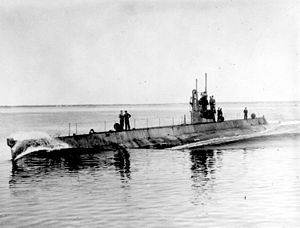USS M-1
 USS M-1
| |
| Class overview | |
|---|---|
| Name | M class |
| Builders |
|
| Operators | |
| Preceded by | L class |
| Succeeded by | AA-1 class |
| Built | 1914 |
| In service | 1915-1922 |
| In commission | 1918–1922 |
| History | |
| Name | USS M-1 |
| Builder | |
| Laid down | 2 July 1914 |
| Launched | 14 September 1915 |
| Commissioned | 16 February 1918 |
| Decommissioned | 15 March 1922 |
| Stricken | 16 March 1922 |
| Fate | Sold for scrap, 25 September 1922 |
| General characteristics | |
| Class and type | Submarine |
| Displacement |
|
| Length | 197 ft (60 m) |
| Beam | 19 ft (5.8 m) |
| Draft | 11 ft (3.4 m) |
| Propulsion |
|
| Speed |
|
| Range | 2,750 nmi (5,090 km) at 11 kn (20 km/h; 13 mph) (surfaced) |
| Test depth | 150 ft (46 m) |
| Complement | 2 officers, 26 enlisted |
| Armament |
|
| Notes | Followed by AA-1-class submarines |
USS M-1 (SS-47) was a unique submarine of the United States Navy. Although built as a fully operational boat, M-1 was built with a radically different double-hulled design.[2] This was in marked contrast to Simon Lake's and Electric Boat's single-hulled concepts. Ultimately shown to be unsuccessful, no other submarines of this class were built, although future advances in construction and metallurgy science made the double hull design a standard one for the USN.[3]
Design
[edit]A double hull design moves most of the fuel and ballast tanks out of the pressure hull and into the spaces between the outer and inner hulls. Electric Boat had built only one other double hull design (EB31A for Russia)[4] and thus lacked experience in this hull type. Due to the boat's still fairly small size the tankage space was very tight and difficult to maintain. It also resulted in a complicated venting and flooding arrangement that at times led to an uneven distribution of ballast water. This led to serious problems in stability when making the transition from submerged to surface.[5][6] To save weight in the pressure hull the structural strength was reduced, making her test depth only 150 feet (46 m).[7] M-1 was built with the same armament and speed as the preceding L-class, but she was larger due to the double hull design. Her battery was also in one large compartment forward of the control room, as opposed to two compartments fore and aft of control room as in other Electric boat designs. She also had heaters to keep the crew warm in northern waters and an icebox for food storage.[8] The partially retractable 3 in (76 mm)/23 caliber deck gun designed for submarines and intended for incorporation in the L-class was installed on M-1 prior to installation on any of the L-class.
Service history
[edit]Her keel was laid down on 2 July 1914 by Fore River Shipbuilding Company in Quincy, Massachusetts, as a subcontractor to the Electric Boat Company of Groton, Connecticut, the designer. She was launched on 14 September 1915 sponsored by Ms. Sara Dean Roberts, and commissioned on 16 February 1918.
Following commissioning, M-1 was assigned to Submarine Division 2 (SubDiv2), and was homeported at Newport, Rhode Island. Unlike most other US submarines, she was not deployed overseas in World War I. For the next three years, she operated off the East Coast, training submariners. During her last year of active service, she was under the operational control of SubDiv 5 and SubDiv 3.
After four years of testing and training service, M-1 was decommissioned at Philadelphia Naval Shipyard on 15 March 1922, struck from the Naval Vessel Register the following day, and was sold for scrap on 25 September to Joseph G. Hitner in Philadelphia, Pennsylvania.
References
[edit]Notes
[edit]- ^ PigBoats.COM Submarine Specifications page
- ^ Alden, pp. 5
- ^ PigBoats.COM M-class page
- ^ Friedman, pp.88
- ^ Alden, pp. 5
- ^ PigBoats.COM M-class page
- ^ Friedman, pp. 83
- ^ Friedman, pp. 88
Sources
[edit]- Alden, John D., The Fleet Submarine in the U.S. Navy: A Design and Construction History, Annapolis: Naval Institute Press, 1979, ISBN 0-87021-187-0.
- Gardiner, Robert and Gray, Randal, Conway's All the World's Fighting Ships 1906–1921 Conway Maritime Press, 1985. ISBN 0-85177-245-5.
- Friedman, Norman, US Submarines through 1945: An Illustrated Design History, Annapolis: Naval Institute Press, 1995, ISBN 1-55750-263-3.
- Navsource.org early diesel submarines page
- PigBoats.COM M-class page
- DiGiulian, Tony Navweaps.com 3"/23 caliber gun
 This article incorporates text from the public domain Dictionary of American Naval Fighting Ships. The entry can be found here.
This article incorporates text from the public domain Dictionary of American Naval Fighting Ships. The entry can be found here.
External links
[edit]- Photo gallery of USS M-1 at NavSource Naval History
